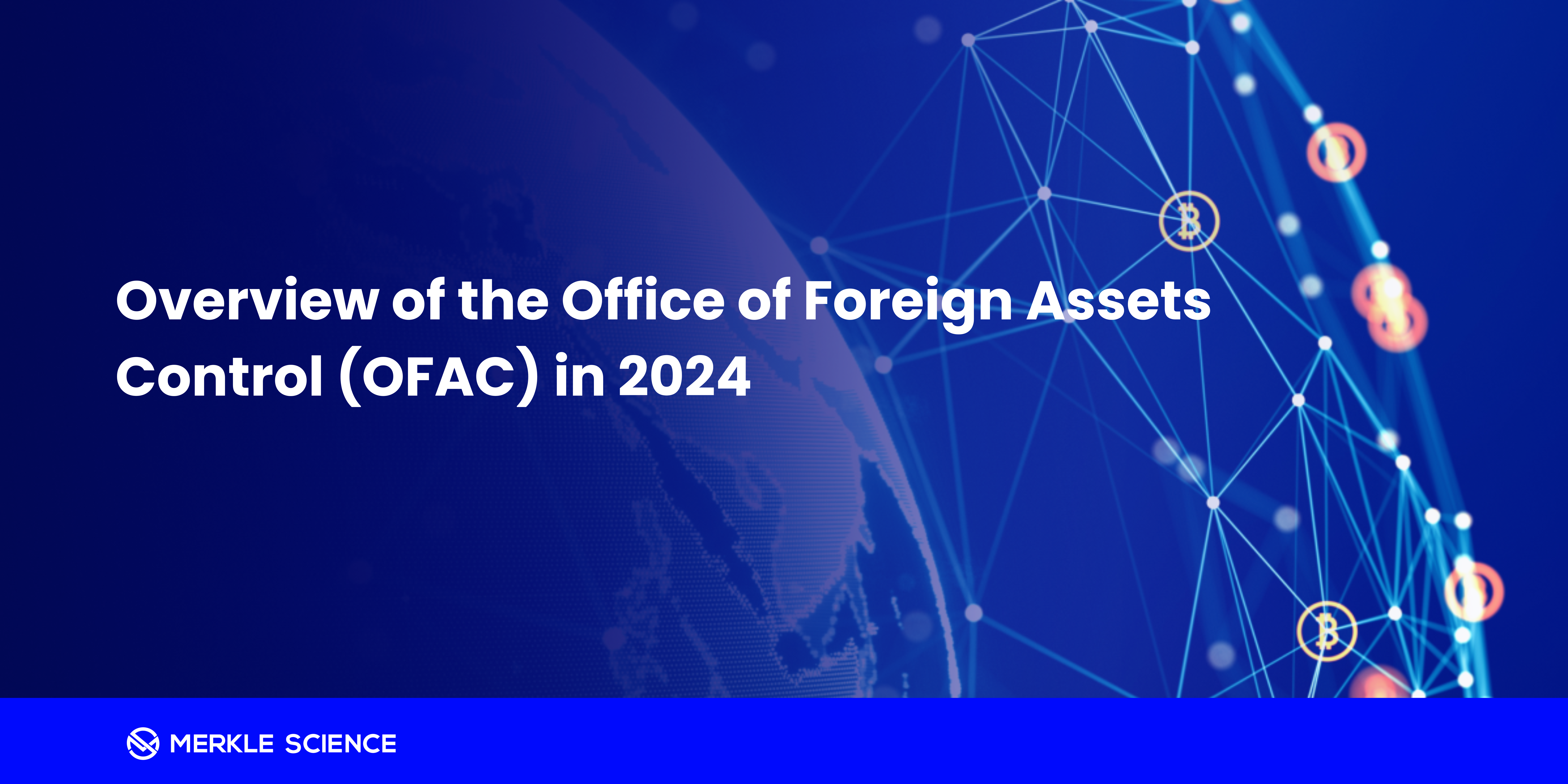Overview of the Office of Foreign Assets Control (OFAC) in 2024

Robert Whitaker

The Office of Foreign Assets Control (OFAC) is a crucial entity within the U.S. Department of the Treasury, responsible for implementing and enforcing economic and trade sanctions based on U.S. foreign policy and national security goals. These sanctions target foreign countries, regimes, terrorists, international narcotics traffickers, and other entities that threaten U.S. interests.
This article provides a comprehensive overview of OFAC in 2024, focusing on its mission, key functions, and the wide range of sanctions programs it administers. It delves into OFAC's evolving role in the regulation and enforcement of sanctions within the digital asset space, highlighting recent actions and guidance specifically targeting cryptocurrencies. The article also includes a detailed case study on the sanctions imposed on Tornado Cash, exploring their impact and the broader implications for privacy and censorship resistance in the crypto industry. By the end of the article, you will gain a thorough understanding of OFAC's strategies, its impact on global financial systems, and how businesses, especially those dealing with digital assets, can ensure compliance with these stringent regulations.
The Mission of OFAC
OFAC’s mission is to safeguard the United States and its allies by using economic sanctions to deter illicit activities and protect national security. Sanctions can be comprehensive, targeting entire nations, or selective, focusing on specific individuals, organizations, or activities that pose a threat. OFAC has a long history, dating back to its predecessor organizations during World War II, and it continues to evolve to address modern threats.
OFAC Key Functions and Sanctions Programs
OFAC administers various sanctions programs, each tailored to address specific global threats. These include:
- Country-Specific Sanctions: Target nations such as North Korea, Iran, and Russia, often involving extensive trade and financial restrictions.
- List-Based Sanctions: The Specially Designated Nationals (SDN) list includes individuals and entities prohibited from conducting business with U.S. persons. These sanctions are crucial for preventing the financing of terrorism and other illicit activities.
- Thematic Sanctions: These address broader issues like cyber threats, terrorism, narcotics trafficking, and the proliferation of weapons of mass destruction.
OFAC and Crypto: Navigating Sanctions in the Digital Age
The rapid rise of cryptocurrencies and digital assets has introduced new complexities for sanctions enforcement. Recognizing the potential for digital currencies to be used in evading sanctions, OFAC has expanded its focus to include digital assets in its enforcement actions.
- Inclusion of Digital Currency Addresses: Since 2018, OFAC has included cryptocurrency addresses associated with sanctioned individuals and entities on the SDN list. This move was first implemented in response to a ransomware scheme involving Iran-based individuals using Bitcoin.
- Sanctions Compliance Guidance for the Virtual Currency Industry: In October 2021, OFAC released guidance tailored to the virtual currency industry, emphasizing the importance of compliance with sanctions laws. This guidance includes recommendations for sanctions screening, transaction monitoring, and other risk-based compliance measures essential to preventing the misuse of digital currencies.
OFAC’s Crypto-Related Sanctions in 2024
In 2024, OFAC has continued to address the use of digital assets in sanctions evasion and other illicit activities. Some key actions in the current year include:
- 911 S5 Botnet Administrators (May 2024): OFAC sanctioned individuals and entities linked to the "911 S5" botnet, which distributed deceptive VPN services to hijack IP addresses used in cybercrime, often paid for with cryptocurrencies like Bitcoin. The designation included multiple cryptocurrency addresses used by these criminals.
- LockBit Ransomware Group Affiliates (February 2024): Sanctions were imposed on Russian nationals involved with the LockBit ransomware group. These individuals facilitated ransomware attacks, accepting payments in cryptocurrencies. The sanctions included ten cryptocurrency addresses associated with their illicit activities.
- Hamas Fundraising through Digital Assets (March 2024): In collaboration with international partners, OFAC sanctioned entities and individuals involved in raising funds for Hamas using cryptocurrencies. The sanctions included several cryptocurrency addresses used in these campaigns, which had raised significant amounts of digital assets.
- Russia-Linked Blockchain Companies (March 2024): OFAC sanctioned Russian entities operating blockchain-based services designed to facilitate sanctions evasion. These companies played a crucial role in circumventing sanctions imposed on Russian nationals by providing blockchain services that obscured the origins and destinations of funds.
Tornado Cash Sanctions: A Case Study
Sanctions Effect
The sanctions against Tornado Cash, a cryptocurrency mixer, illustrate the impact of OFAC's actions on digital asset usage. After OFAC blacklisted Tornado Cash in 2022, the mixer's usage dropped drastically. This sharp decline underscores the effectiveness of sanctions in curbing the use of platforms associated with illicit activities.
The Narrative and Legal Implications
The sanctions raised significant questions about the right to privacy in online transactions and the extent to which these services are censorship-resistant. In August 2024, a report by the Federal Reserve Bank of New York found that while large Tornado Cash pools never fully recovered to pre-sanction levels, smaller pools saw some recovery, indicating continued interest among retail users. This recovery, however, highlighted the fragility of censorship resistance in the crypto space, particularly following an August 2023 court ruling that classified Tornado Cash as an entity under OFAC's definitions, compelling compliance from larger builders.
Ongoing Challenges and Compliance
The Tornado Cash case also highlights the broader challenges in enforcing sanctions in the decentralized finance (DeFi) space. While block proposers include Tornado Cash transactions, block builders often exclude them, reflecting a complex landscape where ideological beliefs about censorship resistance clash with legal compliance.
Expanding Digital Asset Enforcement
OFAC’s approach to digital assets reflects its broader strategy to ensure that cryptocurrencies are not used to circumvent economic sanctions. This includes:
- Regular Monitoring and Updates: OFAC continuously updates its sanctions list to include new cryptocurrency addresses and blockchain entities involved in illicit activities.
- Collaborative Enforcement: Working closely with international partners, law enforcement agencies, and the private sector, OFAC aims to identify and block digital assets linked to sanctioned activities.
- Educational Outreach: OFAC provides guidance and resources to help the virtual currency industry understand and comply with sanctions laws, emphasizing the importance of robust compliance programs.
OFAC Compliance and Penalties
Compliance with OFAC regulations is mandatory for all U.S. persons and entities. Non-compliance can lead to significant fines and criminal penalties. OFAC encourages companies, especially those dealing with digital assets, to develop strong compliance programs, including sanctions list screening and transaction monitoring.
OFAC also provides licenses for certain transactions that would otherwise be prohibited, allowing for legal exceptions under specific circumstances. Entities must apply through OFAC to obtain these licenses.
Conclusion
OFAC continues to play a vital role in enforcing U.S. sanctions and protecting national security in an increasingly complex global financial system. As digital assets become more integrated into the global economy, OFAC remains vigilant in adapting its regulatory and enforcement strategies to meet new challenges.
For businesses navigating the complexities of sanctions compliance, particularly in the digital asset space, Merkle Science offers advanced risk management solutions. These tools help ensure adherence to regulatory requirements, mitigate risks, and maintain the integrity of financial operations in an ever-evolving regulatory environment. Get in touch with Merkle Science today to learn more about our risk management solutions.


